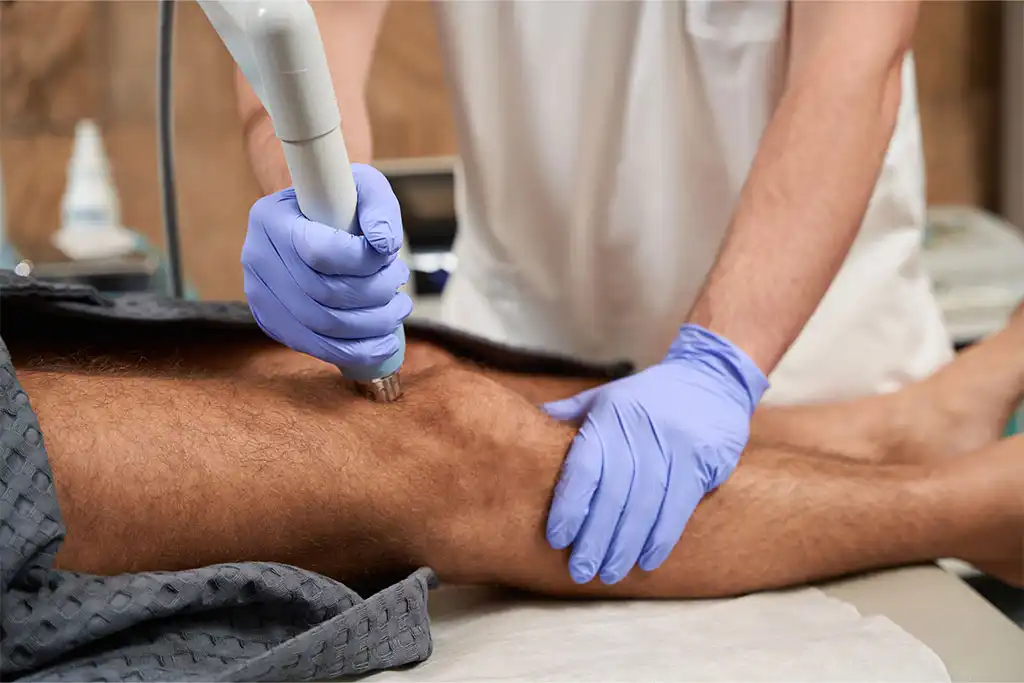Knee pain is a common complaint that can stem from a variety of underlying causes, including arthritis, tendonitis, and other soft tissue injuries. Traditional treatment options like ultrasound, electrical stimulation, laser therapy, and dry needling have been utilized to address these issues, but recent advancements in Extracorporeal Shockwave Therapy (ESWT) offer a promising alternative, particularly with focused shockwave therapy, such as Softwave TRT. This blog will explore how ESWT can help reduce knee pain, its diagnostic capabilities, and the scientific evidence supporting its effectiveness.
Diagnostic Capabilities of ESWT
One of the unique advantages of focused shockwave therapy, such as Softwave TRT, is its diagnostic capability. During treatment, the device emits shock waves that travel at ultrasonic speed and penetrate deep into the tissues, allowing the practitioner to identify areas of tissue irritation and inflammation. When the shockwaves encounter damaged or irritated tissue, they produce a noticeable sensation, helping to pinpoint the exact location of the problem. This diagnostic ability enables a more targeted treatment approach, ensuring that therapy is applied precisely where it’s needed most.
Mechanism of Action: Promoting Tissue Regeneration
The primary mechanism by which ESWT alleviates pain is through promoting tissue regeneration. When focused shockwaves are applied to the affected area, they induce a cascade of biological responses that enhance the body’s natural healing processes. Here’s how it works:
- Increased Blood Flow: The shockwaves stimulate the formation of new blood vessels (neovascularization) in the treated area, which improves blood circulation. Enhanced blood flow delivers more oxygen and nutrients to the damaged tissues, accelerating the healing process.
- Cellular Repair and Growth: ESWT promotes the release of growth factors, such as vascular endothelial growth factor (VEGF) and transforming growth factor-beta1 (TGF-β1), which play a crucial role in tissue repair. These growth factors encourage the proliferation of fibroblasts and other cells involved in tissue regeneration, leading to the repair of damaged tendons, ligaments, and cartilage.
- Breakdown of Calcifications: In cases where pain is associated with calcific deposits, such as calcific tendonitis, ESWT can help break down these deposits, facilitating their resorption and reducing pain.
- Pain Reduction: The shockwaves also have an analgesic effect by modulating nerve activity and reducing the transmission of pain signals to the brain. This effect is particularly beneficial for patients with chronic knee pain, where the goal is to not only heal the underlying tissue but also manage pain effectively.

Scientific Evidence Supporting ESWT for knee pain
Numerous studies have demonstrated the efficacy of ESWT in treating knee pain, particularly when compared to other treatment modalities. A systematic review published in the journal Clinical Orthopaedics and Related Research found that ESWT was more effective in reducing pain and improving function in patients with patellar tendinopathy than traditional treatments like ultrasound and electrical stimulation . Another study published in the American Journal of Sports Medicine highlighted the long-term benefits of ESWT for knee osteoarthritis. The study showed that patients who received ESWT experienced significant pain reduction and improved joint function compared to those who underwent conventional physical therapy. The effects were sustained over a 12-month follow-up period, indicating the long-term efficacy of the treatment . In terms of safety, ESWT has been shown to have a favorable risk profile. Unlike invasive procedures such as dry needling or surgery, ESWT is non-invasive and associated with minimal side effects. A review in the Journal of Orthopaedic Surgery and Research confirmed that ESWT is safe for long-term use and does not carry the risk of complications like infection or tissue damage that are associated with more invasive treatments .
Conclusion
Focused shockwave therapy, such as Softwave TRT, represents a significant advancement in the treatment of knee pain. Its ability to diagnose irritated tissue, promote tissue regeneration, and provide long-term pain relief sets it apart from other modalities like ultrasound, electrical stimulation, laser therapy, and dry needling. Supported by a growing body of scientific evidence, ESWT offers a safe and effective solution for patients suffering from knee pain, helping them regain mobility and improve their quality of life. If you’re experiencing knee pain and are interested in exploring this innovative treatment option, consider scheduling a consultation to see if focused shockwave therapy is right for you.
About the Author

Dr. Sarah Crawford earned a Doctorate of Physical Therapy from the University of Miami (FL) in 2011 and a Bachelor of Arts in Sociology from The Ohio State University in 2008. She is an active member of the American Physical Therapy Association (APTA) as well as the Ohio Physical Therapy Association (OPTA).
She brings over 10 years of experience as Physical Therapist in addition to healthcare administration. She has served in roles from office manager, clinical director and partner for several local, independently owned physical therapy practices before opening Anchor Wellness Inc. and the Anchor Wellness Center in 2019.


